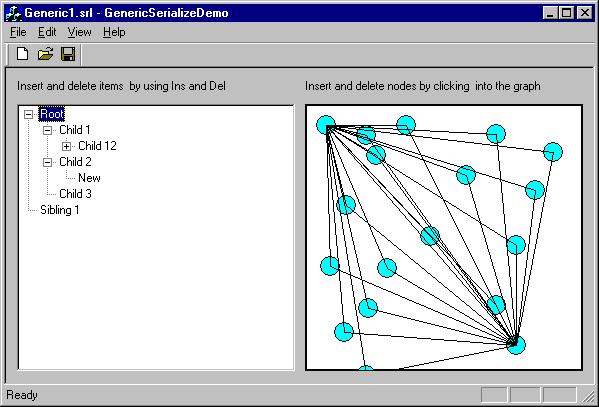Download demo project - 25 Kb Download source - 3 Kb
Introduction
The methods in the MFC classes CObject and CArchive
provide a framework for serialization but give no help when one has to serialize
complex data structures containing cyclic references.
The functions GenericSerialize and GenericDeserialize presented
in this article implement a general serialization algorithm. These
C++ template functions can handle any homogenous datastructure (datastructure consisting of
nodes having all the same type).
The user has to provide a so called Accessor class which is responsible for
- defining a typedef name called
Type which gives the type of a node pointer.
- providing a member variable called
ar which must be a reference
to an archive object.
- providing a member function
Null() which returns the null value for Type
- serializing and deserializing a single element.
- returning the immediate neighbors of an element.
Interface
template<class Access>
void GenericSerialize(const Access& a);
template<class Access>
void GenericDeserialize(const Access& a);
struct MyAccess
{
typedef MyPointerType Type;
CArchive ar;
Type Null()
{}
void GetNeighbors(Type current,vector< pair<Type,int> >& vecNeighbors)
const
{ }
void SerializeThis(Type owner,Type current,int nTyp)const
{ }
void SetReference(Type owner,Type current,int nTyp)const
{ }
};
Example A - Serialization of a tree view control
The demo project serializes a tree view control by a call to
the following function.
void CGenericSerializeDemoView::TreeSerialize(CArchive& ar)
{
TreeAccess access(m_Tree,ar);
if (ar.IsStoring())
{
GenericSerialize(access);
}
else
{
m_Tree.DeleteAllItems();
GenericDeserialize(access);
ApplyItemStates(m_Tree.GetRootItem());
}
}
The following Accessor class is the user provided part for the serialization of a tree view control.
struct TreeAccess{
TreeAccess(CTreeCtrl& rTree,CArchive& rAr):tree(rTree),ar(rAr){}
typedef HTREEITEM Type;
#define TA_eRoot 0
#define TA_eChild 1
#define TA_eSibling 2
CTreeCtrl& tree;
CArchive& ar;
HTREEITEM Null()const {return NULL;}
void GetNeighbors(HTREEITEM current,vector< pair<Type,int> >& vecNeighbors)
const
{
if(current==NULL){
HTREEITEM hItem= tree.GetRootItem();
if(hItem){
vecNeighbors.push_back( make_pair(hItem,TA_eRoot));
}
}else{
HTREEITEM hItem= tree.GetNextSiblingItem(current);
if(hItem){
vecNeighbors.push_back(make_pair(hItem,TA_eSibling));
}
hItem= tree.GetChildItem(current);
if(hItem){
vecNeighbors.push_back(make_pair(hItem,TA_eChild));
}
}
}
void SerializeThis(HTREEITEM owner,HTREEITEM current,int nTyp)const
{
ar << tree.GetItemText(current);
ar << tree.GetItemState(current,TVIF_STATE);
}
HTREEITEM DeserializeThis(HTREEITEM owner,int nTyp)const
{
CString strItemText;
UINT nState;
ar >> strItemText;
ar >> nState;
HTREEITEM hItem;
switch(nTyp){
case TA_eRoot: hItem= tree.InsertItem(strItemText); break;
case TA_eChild: hItem= tree.InsertItem(strItemText,owner); break;
case TA_eSibling: hItem= tree.InsertItem(strItemText,
tree.GetParentItem(owner),owner); break;
}
tree.SetItemData(hItem,nState);
return hItem;
}
void SetReference(HTREEITEM owner,HTREEITEM current,int nTyp)const
{
}
};
Example B - Serialization of a general graph
The following Accessor class is the user provided part
for the serialization of a Graph consisting of nodes having the following definition
struct Graph{
Graph(int x=0,int y=0):x(x),y(y){}
int x,y;
vector<Graph*> vecConnections;
};
struct GraphAccess{
GraphAccess(vectorGraph& rGraph,CArchive& rAr):graph(rGraph),ar(rAr){}
typedef Graph* Type;
vectorGraph& graph;
CArchive& ar;
#define GA_eRoot 0
#define GA_eConnect 1
Graph* Null()const {return 0;}
void GetNeighbors(Graph* current,vector< pair<Type,int> >& vecNeighbors)const
{
if(current==NULL){
for(unsigned i=0;i<graph.size();i++){
vecNeighbors.push_back( make_pair(graph[i],GA_eRoot));
}
}else{
for(unsigned i=0;i<current->vecConnections.size();i++){
vecNeighbors.push_back( make_pair(graph[i],GA_eConnect));
}
}
}
void SerializeThis(Graph* owner,Graph* current,int nTyp)const
{
ar << current->x;
ar << current->y;
}
Graph* DeserializeThis(Graph* owner,int nTyp)const
{
int x,y;
ar >> x;
ar >> y;
graph.push_back(new Graph(x,y));
return graph[graph.size()-1];
}
void SetReference(Graph* owner,Graph* current,int nTyp)const
{
if(owner!=0 && nTyp==GA_eConnect){
owner->vecConnections.push_back(current);
}
}
};
This member has not yet provided a Biography. Assume it's interesting and varied, and probably something to do with programming.
 General
General  News
News  Suggestion
Suggestion  Question
Question  Bug
Bug  Answer
Answer  Joke
Joke  Praise
Praise  Rant
Rant  Admin
Admin 





